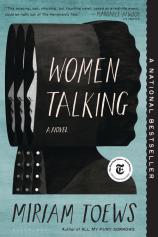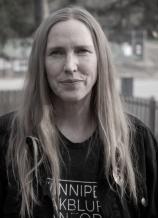Women Talking
Review
Women Talking
I started hearing about Miriam Toews’ WOMEN TALKING months ago, before it was published in her home country of Canada last year. Based on what I was hearing from the Canadians I follow on Twitter, I couldn’t wait to read it. Now American readers can finally get their hands on this remarkable novel, one that is sure to spur deep thought and (appropriately enough) even deeper conversations.
Chillingly, Toews opens the book by noting that its horrific premise was prompted by a real-life incident at a Mennonite colony in Bolivia. The setting here is a Mennonite colony in Manitoba called Molotschna. For years, the women and girls of Molotschna would awake from sleep bruised, bloodied and sore. Some of them became pregnant. They believed (because of what they were told) that they were visited by demons who raped them while they slept. But when one of the women awoke and identified her attacker, they soon realized that, far from demons, the perpetrators were the men they knew --- their husbands, brothers and neighbors --- who drugged them with belladonna as they slept and violated them.
"...a testament to kindness and resilience, to humans’ ability to imagine, be curious about and wonder at a world they’ve never seen, and their hope and belief in a future they themselves might never see."
WOMEN TALKING opens as the accused men, who have been in the city awaiting trial, are about to return to Molotschna on bail. The women have a grave and urgent choice to make. Do they do nothing, stay and fight, or leave altogether? This debate is taken up by two multigenerational families of women --- the Loewens and the Friesens. They’ve jointly decided that doing nothing is not an option, but they differ in what they think they should do.
This decision is complicated by the fact that the women speak only Plautdietsch, a German dialect spoken by some Mennonites but by virtually no other Canadians, and they are illiterate in any language. As they contemplate the previously unimaginable prospect of leaving the only community they’ve ever known, they realize just how powerless they are: “We’re unable to leave, we’re unable to write, we’re unable to speak the language of our country, we have only domestic skills that may or may not be required of us elsewhere in the world, and speaking of the world --- we have no world map…”
In order to document their meeting, the women have secured the services of the novel’s narrator, August Epp, the only man they can trust. August, who was born in Molotschna but whose family left in disgrace, has recently returned to the colony as the schoolteacher (of only boys, naturally). Derided by the other men as not masculine enough, he is labeled a “schinda,” “one not clever enough to know how to farm,” which he describes as “the king of insults in Molotschna.” Even as August documents the women’s conversations, he reveals much about himself --- his family history, his personal history of nervous breakdown (or “Narfa”), and, most poignantly, his love for Ona Friesen, one of the women participating in the debate and the one who enlisted his assistance as their scribe.
The women’s conversation is wide-ranging, philosophical and brave, spanning considerations of justice, forgiveness and the possibility of redemption, even as they also contend with the truly horrendous evil that has damaged them individually and as a community. One realizes that these ladies --- scarred, terrified and utterly unable to imagine the world outside their closed community --- are in a position to create their own future (and, even more so, to create a revolutionary future for their children and grandchildren), seizing an opportunity to refashion their lives with themselves at the center for a change.
Despite its very dark premise, WOMEN TALKING is also quite funny, as the women’s banter hints at long-standing feuds and fondnesses, and they gently chide August for what they view as his too-worldly outlook. When, in the context of a conversation about long-range thinking, August tells Ona about a musical composition by John Cage that will take over 600 years to play, Ona responds, “Is John Cage a Mennonite?”
With its setting within a repressive society, its feminist message and its Canadian author, WOMEN TALKING has garnered many comparisons to THE HANDMAID’S TALE, but it also should be read and appreciated for itself. More than anything, it is a testament to kindness and resilience, to humans’ ability to imagine, be curious about and wonder at a world they’ve never seen, and their hope and belief in a future they themselves might never see.
Reviewed by Norah Piehl on April 12, 2019
Women Talking
- Publication Date: March 3, 2020
- Genres: Fiction, Women's Fiction
- Paperback: 240 pages
- Publisher: Bloomsbury Publishing
- ISBN-10: 163557434X
- ISBN-13: 9781635574340




